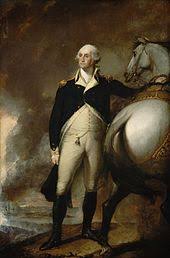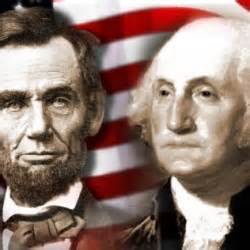There are a few books on American history that beg to be re-read every so often. On my list are Doris Kearns Goodwin’s A Team of Rivals, David McCullough’s 1776 and Joseph Ellis’ His Excellency: George Washington. My recent re-immersion into these books was done through a set of Type (MBTI and the Pearman) lenses, and one of the conclusions I am left with is that at the two most critical times of our nation’s history, two leaders with starkly different Types came to power, and it was by fully embodying and deploying those different preferences when they did and how they did that actually proved pivotal in both the establishment of our nation (in Washington’s case) and then in the saving of it (in Lincoln’s). So in a very important way, our national embrace of Type diversity at critical times (exercised through the election of our leaders), has been our nation’s salvation.
George Washington—The Father of a Nation

It is hard to overstate the importance of George Washington to our nation’s founding and to the establishment of our stable government. Our first President, and arguably our greatest, Washington brought a combination of qualities to his role as Commander of the Continental Army and then as our first Civilian Commander in Chief that made him what few other men or women in history actually are: indispensable.
I believe George Washington to have had ESTJ preferences.

- E: Washington was a social, gregarious man who received and entertained many guests throughout his life. He was known by many contemporaries as a good and frequent dancer. A great horseman, Washington’s life was movement and action. While intelligent and quick to learn, he did not live a life of the mind. Washington’s life (as a surveyor, a soldier, a general, a wealthy planter, a President) is a series of actions and engagements. Washington strikes me as an Extravert.
- ST: Washington was not a visionary, but the vision of our nation could not have come to fruition without him. His personal goals seemed to spring from the physical world and existing socio-political system within which he existed. Early in his life, Washington wanted a commission in the British Army—he wanted to be a British Gentleman. It is only after he discovered that this goal would remain unfulfilled that thoughts of American independence began to take root.
- In his career as Commander of the Continental Army, Washington lost more battles than he won. He started in the role believing that direct confrontation of the enemy’s massed forces was the way wars were fought–that is what he know and had experienced in the past. However, hard logistical facts on the ground led Washington to believe that his goal was less to win and more to avoid losing. He needed to fight a war of attrition. This was a radical shift in Washington’s approach, but it came not from a conceptual re-framing of the ideas of battle, but through his evidence and experience on the ground, through cold calculation–the math of the challenges he faced.
- Washington, like many Gentleman planters of the south, was a slave owner, but unlike Jefferson, Madison, Monroe, Jackson and most others of his race and socio-political class, Washington freed his slaves at the end of his life. His decision to do so seems to me revealing about his Type. As the owner and manager of Mount Vernon Plantation, Washington calculated a cost-benefit analysis of slavery. He calculated the fully loaded cost of the labor he was getting from the laborers he “owned”–their food, lodging, health care, et cetera and the labor he was getting in return. His conclusion was that the system was–while arguably immoral–certainly inefficient. He made more money from paid laborers he did not have to fully support. Many of us–with our more modern eyes and ears–may consider this side of Washington with scorn and condemnation, but his journey toward enlightenment on the slavery issue was driven very much by the data, the math and the logic of the problem. Washington seems, to me, to have Sensing and Thinking preferences.
- SJ: Like all SJs, Washington was an authority-dependent manager, leader, soldier and man, who continually worked in support of organizational structures. Propriety, responsibility, hierarchy, chain of command—these were all forces that drove and motivated George Washington. He was keenly aware that the head of a successful and legitimate enterprise should look and act the part, and accordingly, he paid close attention to uniform, title, rank, the protocols and courtesies that accompany positions of power. This emphasis of chain-of-command, hierarchy and the establishment of the “correctness” of operations and engagement were of tremendous value in giving the government legitimacy, structure and stature. Everything that followed—and that there was even a nation that would follow—is largely due to the focus, structure and sound organizational judgment of George Washington, who continually projected the bearing, values and behavior of the SJ temperament.
- ESTJ: I have heard scholars and type enthusiasts argue that Washington was or may have been an ISTJ. While a sound argument for this could be made, I believe the combination of his frequent social engagements, the breadth of this reputation (so many people knew and had engaged with him), his life-long pursuit of the public eye (military, local and then national politics), and this drive to control, structure, manage and order the world around him (extraverted Thinking as a dominant function) all leave us with an ESTJ portrait of George Washington, our foremost founding parent.
Abraham Lincoln: The Savior of a Nation
The only President the United States has elected that faced conflicts as dire and odds as long as Washington—arguably longer—was Abraham Lincoln. The crushing challenges of leading a nation of such fractious and bitter political, moral, economic and regional rivalries demanded a leader that could bring great Emotional Intelligence, political acumen and moral clarity to the role. In 1860, the United States stared into an abyss that threatened dissolution of the union and war.

Lincoln, in a way no other person of his age had done, not only envisioned a different, truly more perfect union, but he actually acted to keep the nation together and created in the United States a new birth of freedom. He led and facilitated the re-connection of the United States to its founding principles, and he settled once and for all time, the question of slavery in the United States, a task that proved too complex and contentious for even the collective genius of our nation’s founders 80 years prior.
I believe Abraham Lincoln to have had INFP preferences.

- I: Lincoln was known—in spite of his penchant for storytelling and traveling the legal circuit in Illinois as a lawyer—as a pensive, quiet man who kept his own council. He was a deep thinker that would internally focus and let his thoughts steep before bringing them out in the form of a plan, an argument or a speech. I believe Abraham Lincoln preferred Introversion.
- NF: Like most NFs, Lincoln had a network of friends, colleagues, and relationships that he cultivated to support his success in both his Springfield law practice and in politics. His political philosophy concerning preventing the spread of slavery reflected his visionary and future focus, but he was always able to communicate this values-based vision with compassion.
- President Lincoln worked tirelessly to commute the death sentences of Union soldiers convicted of capital offenses, always happy to see anyone’s life saved. He even wished that the Confederate Government officials, once caught, would be allowed to slip away to Mexico to avoid the capital punishment that would likely await them if captured. Robert E. Lee and the Army of Northern Virginia inflicted more death and destruction on the United States Army than any other army in history (before or since the Civil War), yet Lincoln’s clear wish was for mercy and forgiveness, not vengeance.
- In addition, Lincoln–while Commander in Chief–did not lead or influence primarily through the immense power of his office, but through the weight of his argument, his moral stance and the personal power of his relationships. When talking to his cabinet or with Secretary of State Seward, all Lincoln had to do was order them to carry out his bidding, but he wanted not just the compliance of those around him–he wanted their commitment. All these leadership qualities reflect a likely preference for iNtuition and Feeling.
- P: So much of Lincoln’s outer world engagement and communication was through stories, facilitated discussion or questions—he clearly had inner focus and resolve but an outer-world demeanor that was flexible, curious and patient. Even the flow of the Civil War—reflecting the preferences of the President at the helm—suggests more adaptability and flex than command and control. It started as a fight to preserve the Union and shifted to a fight to abolish slavery. Lincoln changed generals at the helm of the Army of the Potomac over seven times before finding the person who could get the job done. He was constantly changing, learning from his last experience and applying it to his next. This open, adaptive and curious approach—unusual for an executive leader, especially a President—suggests a preference for Perceiving.
- INFP: I have heard credible arguments that Abraham Lincoln was an ENFP (rooted in his love of story-telling) and yet others that he preferred INTP (based on his vision and lawyerly approach to governance and penchant for argumentation). While I find these arguments compelling, I have not seen or worked with an ENFP who was driven or energized by an inner voice and who—in such critical hours—took such consistent refuge in solitude. In addition, I’ve worked with no INTPs who were as concerned with mercy, relationship management and the alignment of their values with the world around them as was Lincoln. I believe in Abraham Lincoln, we get the chance to see something fairly rare, a highly public and competent INFP executive and military leader.
The typological contrast of Washington and Lincoln present some interesting ironies:
- At the nation’s founding, there were no procedures in place and no history or precedent upon which to draw. So much of the first President’s actions would need to be improvised, and we had a President in George Washington whose type (ESTJ) is one of the least comfortable with improvisation.
- In Abraham Lincoln, we had a future-focused, change-oriented leader (INFP) whose primary focus was stability and preservation of the Union.
- With ESTJ as a type, we had in Washington a President who helped establish the authority and dignity of the Chief Executive—always projecting the image of propriety and protecting the sanctity of the chain of command. He created the mold and template for that office that every other President has followed. Yet, one of the greatest gifts Washington gave the United States was his stepping away from power (an act the world had not witnessed a leader perform before). We looked to this ESTJ to relinquish power and step down, and he did it.
- In the harshest, most violent and bloody period in our nation’s history, we looked to an INFP—a Type widely associated with conflict avoidance and even pacifism–to lead armies, wreak havoc and drive dramatic social and cultural change.
I love the thought that at the two most critical times of our history, the American people elected the leaders they most needed to establish and then save the Union, and that these leaders were, typologically, likely four-letter opposites. Type diversity, and the American public’s willingness to embrace it, has actually saved and preserved us.
As Washington and Lincoln remind us, there is not a good leadership Type. Each set of preferences comes with hard-wired benefits (and baggage), and it is how each individual exercises these preferences within the context of his or her time and place that allows for effectiveness–and maybe even greatness.





Thanks for the info on Washington (our president) and Lincoln.
Where does Trump fit in, besides malignant narcissism?
Three of my favorite interests – presidential history, leadership development, and type development all in one blog – thoroughly enjoyed it! Thanks for sharing your insights and the emphasis that leaders are made, not born.
You do not do American Indians, the most disengaged racial group in the workforce any favors by carrying on the racist legacies of Washington and Lincoln.
According to American historian David E. Stannard, Georg Washington, the father of our country did not seem to like American Indians very much. In 1783, he compared American Indians to wolves when he proclaimed, “Both being beast of prey, tho’ they differ in shape.”
It appears that the “scorched earth policy” so brilliantly implemented by General William Sherman during a Civil War between mostly white people, was first implemented in American warfare by generals under Washington’s command. While attacking the Iroquois people, the tribe whose constitution was copied by the Founding Fathers, Washington ordered Major General John Sullivan in 1779 to “lay waste all the settlements around…that the country may not be merely overrun, but destroyed.” Washington also instructed Sullivan to not “listen to any overture of peace before the total ruin of their settlements is effected.”
Stannard reminds us that Washington was a huge advocate of exterminating American Indians as evidenced by his troop’s practice of skinning the bodies of dead Iroquois. I bet you thought American Indians were the first ones to initiate scalping and mutilation. The skin removed from the hips down was often used as boot tops or leggings.
American Indians who were lucky enough to endure the military exploits of Washington gave our country’s first president the nickname “Town Destroyer.” Stannard noted that 28 to 30 Seneca tribal settlements were also destroyed by Washington and his combatants.
Abraham Lincoln was not much better.
Even the President who freed the slaves could not see fit to view American Indians in the category of people who are created equal.
Dee Brown in his book, Bury My Heart at Wounded Knee, talks about how Lincoln was responsible for the largest mass execution in US History. In 1862, Lincoln commissioned the hanging of 38 Dakota Sioux prisoners in Makato, MN. Charged with crimes with little proof, many of these captives were non-violent cultural or religious leaders of their Tribe.
Lincoln also had the audacity in 1863 to say to a group of American Indian Chiefs who were visiting him in Washington, DC, “We are not as a race so much disposed to fight and kill one another as our Red Brethren.” These American Indians must have been puzzled by such a statement since by that time, 300,000 had died during the Civil War that happened on Lincoln’s watch.
Lincoln signed the Homestead Act and the Pacific Railway Act of 1862 which guaranteed the loss of land, natural resources, culture and language for American Indians.
Lincoln’s Indian Office to be later called the Bureau of Indian Affairs never took their government to government relationship seriously with Tribes which led to corruption among Indian agents who often stole provisions and other resources earmarked for American Indians.
The 1863 Lincoln administration was responsible for the removal of Navajos and Mescalero Apaches from the New Mexico Territory. By the time a treaty had been signed, nearly 2,000 Navajos died as a result of this relocation. Some folks call this Lincoln’s “Trail of Tears.”
W. Dale Mason describes Lincoln’s policy toward American Indians as one of “wards of the government.” He never viewed the civil rights of American Indians in the same way he viewed civil rights for African Americans. For American Indians, there was no Emancipation Proclamation under Lincoln.
I am not saying that personality and temperament differences are not important. I am making the case that racial inclusion is just as vital. We do not do that cause any favors when we promote the acceptance of personality and temperament differences on the backs of so call role models who never saw all human beings as having dignity and value.
Richard, I both agree with your comments as well as appreciate the time you took to craft such a thoughtful, detailed reply. The thrust of my comments we about Type and how very different Type preferences were able to lead effectively at two very different crisis points. While I am a fan of both of these leaders, I am also clear-eyed in my understanding that their faults and failings were many. The racism and genocidal cruelty our nation has shown to Native Americans is an un-ending stain on our culture and in our history. And while Washington and Lincoln took active parts in this cruel history, the diminishment and disregard of Native Americans continues to this day–even while we rightly struggle to include others people and groups into our collective concept of our more perfect union.
There is no cultural story without a shared history and mythologized people and events that came before. Washington and Lincoln are an undeniable force and presence in our collective past. They both did remarkable things without which the United States may well not exist, AND they both had limitations, prejudices and priorities that perpetuated the pain, suffering and exclusion of the Americans who inhabited this land before the United States muscled it away from them. As a history buff, I believe it is important to embrace and even celebrate the good while also taking an honest look at the hurtful and backwards (and in this case, racist) actions that historical figures engaged in. Both are true, so let’s understand it all. Richard, your reply helps us–helps me–do that, and I really appreciate your taking the time to fill out the record a bit.
Hile Rutledge
Very interesting and seems about right. I have read a lot about both men, but never thought about them re: TYPE.
Thank you for this, Hile. I appreciate your observations–and concur with your conclusions!